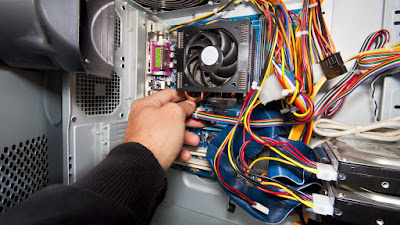10 Top Reasons Why I Have to Upgrade My Computer
The rate at which technology is improving is very fast and in the time you get comfortable with the computer hardware you have bought, several new and improved models appear in the market.
While some people prefer to keep their computers state of the art, most of us have a 'If it isn't broken, don't fix it' attitude when it comes to upgrading or replacing our computers.
This is a strategy that could prove expensive in the long run. It is always better to upgrade your computer on a regular basis, especially if you have had it for over 2-3 years. Even if your computer has had a largely trouble-free existence, you really need to consider periodic upgrades and here are the reasons why you must dos so:
1. Increase in Processing Speed - This is one place where you really get to notice an improvement in performance. If you are upgrading from a Celeron 433MHz processor to a Pentium 4 1.6GHz, you would really notice the difference in performance!
2. Faster Memory Access - Improvements in CPU speed are usually accompanied by improvements in the speed at which data transfer occurs between the CPU and RAM. This is another area that provides an improvement in performance.
3. Size and Capacity improvements - Technology drives a reduction in component size coupled with an increase in storage capacity. This means that a RAM card or Hard disk of the similar size as the older ones in your computer could have double the capacity!
4. Software Compatibility - Many of the new software packages you may wish to use in order to improve your productivity or entertainment experience may not function well on you old computer. It is better to upgrade your computer to enjoy the benefits of new software fully.
5. Obsolescence of Hardware - As your hardware gets older; getting a replacement will get more difficult once manufacturers begin phasing out the production. With improvement in technology, the older hardware becomes cheaper initially and becomes expensive as supply dries up.
6. Technical Support Issues - Many manufacturers stop providing technical support for older components as they cease production. The older your computer gets, the harder it is to find help in fixing it when it malfunctions.
7. Development of New Hardware - New hardware products appear in the market frequently that revolutionize your computer experience and are based on newly developed technology. The chances of your old computer supporting new devices are very low.
8. Faster Devices - Your old computer may not be in a position to accommodate the speed at which the new devices communicate.
9. New, Fast Communication Protocols - You may not be able to implement newer or faster communication protocols in your old computer because the hardware is unable to support them.
10. Operating System and File Format - Your old hardware may not be able to run newer operating systems and some of the file formats may not be supported.
Ms. Pinky is a Computer Support Specialist for more than 25 years. Has a Bachelor of Science Degree in Computer Engineering, MS Research work in Systems Engineering.
Get more free computer tips on her blog at http://www.computerhelpdeskandsupport.com/
Article Source: http://EzineArticles.com/expert/Pinky_Maniri/23183




![Real Madrid 3 – 0 Sevilla [Copa del Rey] Highlights 2016/17](https://blogger.googleusercontent.com/img/b/R29vZ2xl/AVvXsEhMZJK7EgqmJ1vO4mp3J87i-bRYaJZxiyylnDWq_4gLNqAGCMAD3Ilqs92pdfA6xdXUdE280wfvcFs2oXomDARXtTC4EpQSkgg7-m4433wrV9y1DF0JLQYsFQPoJvO5s9JBm7gGW7p34Do/s200/t%25C3%25A9l%25C3%25A9chargement+%25284%2529.jfif)












Aucun commentaire: